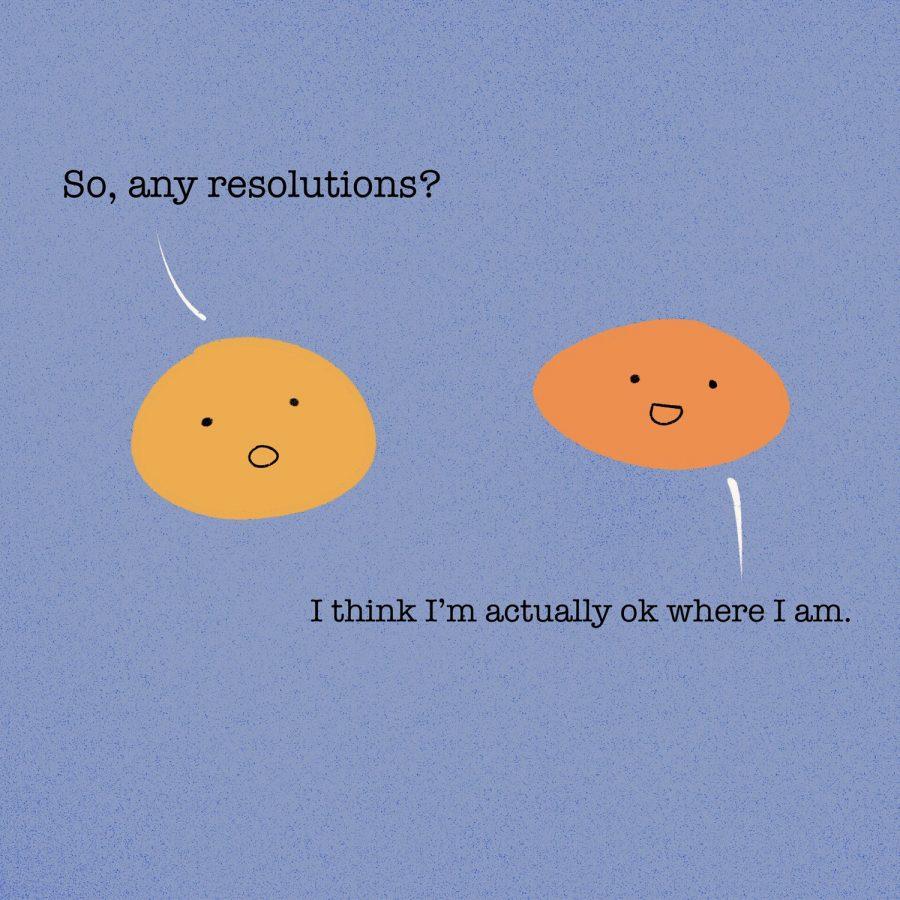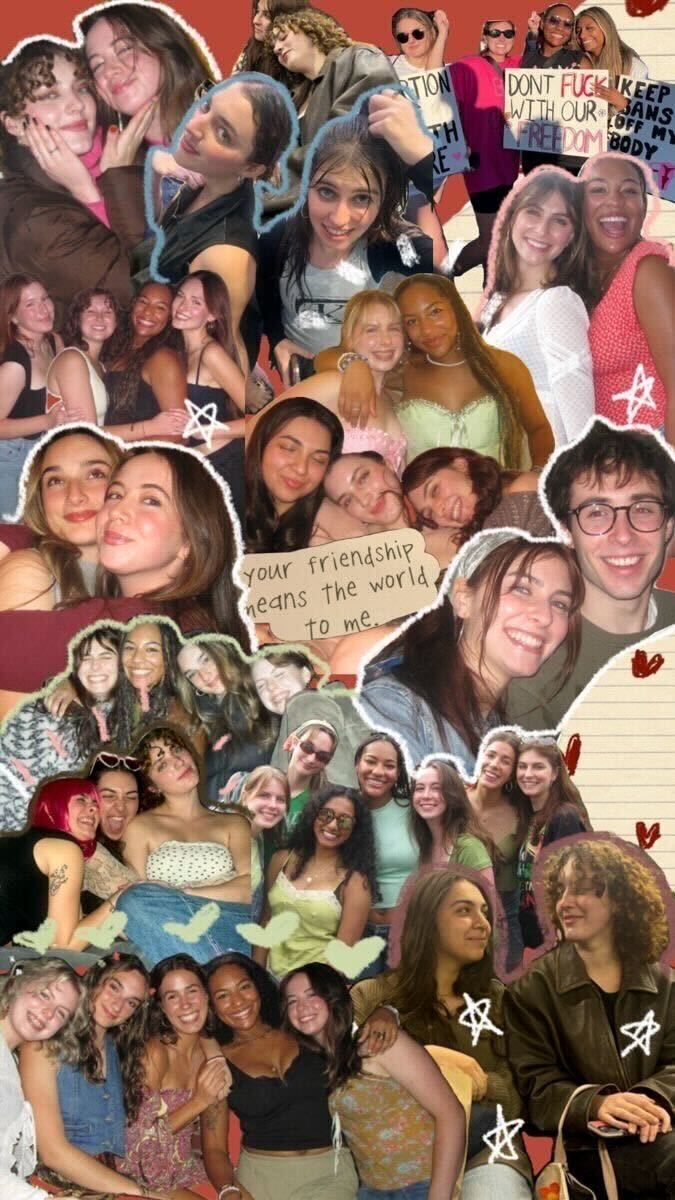Opinion | This year, embrace the “work in progress”
January 5, 2020
I’m striving to be more candid. With that in mind, it’s time for me to make a confession — I really don’t know what I’m doing.
I’m nearly halfway through my college career and haven’t worked out all the nitty-gritty details of what my political science concentration is — or what a concentration actually is. I work two jobs, but still haven’t figured out this whole budgeting thing, especially when it involves food. I think I’m doing my laundry properly, but I don’t know why my Tide Pods sometimes leave this weird blue residue on my T-shirts. I love tea but I’m definitely oversteeping it — unless I’m understeeping it. The list goes on.
I’m nearing 20, yet I feel like I have the experience of a toddler and willpower of a elderly woman who’s been over it for a decade and a half. In short, I feel like I’m wandering through life without a map while my peers have Waze premium with six different GPS narration offerings. This feeling of inferiority can be a challenge when part of your job is writing columns advising others on why they should listen to your opinion or follow your advice.
Yet according to Gill Corkindale, executive coach and writer, I am not alone in feeling that I have to put on a facade of expertise.
“Imposter syndrome can be defined as a collection of feelings of inadequacy that persist despite evident success,” Corkindale explains. “‘Imposters’ suffer from chronic self-doubt and a sense of intellectual fraudulence that override any feelings of success or external proof of their competence.”
About 70% of people will experience imposter syndrome at one point or another, especially women viewed as high-achievers, according to a 2011 study from the Behavioral Science Research Institute. Rather than silently suffering with this anxiety alongside so many of our peers, it’s time we stop invalidating our successes and learn to appreciate the things we have yet to master.
I, and many others like me, feel the weight of missteps or shortcomings far more than the triumphs of my successes or acclaim. I’m often more upset when I get a C on a quiz than I am excited about an A on an exam. One bad review sticks with me more than countless comments of support. My resumé often reminds me of the roles I didn’t get rather than the ones I adored playing. I beat myself up over missing a day at the gym, regardless of how many times I did go that week.
Especially at this time of year, when millions worldwide make a list of their shortcomings and aim to cut their bad habits cold turkey, it is easy to believe that everyone else is perfecting themselves instantaneously while you are still struggling. But in actuality, according to U.S. News and World Report, 80% of New Year’s resolutions fail by February. When the clock hits midnight, we don’t suddenly get the power to flip a switch and fix the things we don’t like about ourselves. Frankly, I’m sick of feeling inferior for not knowing, sometimes coming up short and being a fallible human being just like everyone else.
This year, I’m foregoing the traditional New Year’s resolution list and instead opting for candor. I’m aiming to lean into my inadequacy, knowing many others around me are struggling with the same thing. I am an expert in not knowing everything and, at some point, we all must learn to appreciate that expertise in and of itself. I’m not saying we shouldn’t continually work on ourselves, but there is no perfect, completely finished state of being we are striving toward.
So, from one non-expert to another, here’s what helps me come to terms with imperfection.
First, imposter syndrome relies on our belief that we are only the only ones facing it. For me, it’s helpful to tell people how I’m feeling and hear others express similar sentiments. My bi-weekly dose of acceptance comes from my favorite podcast, ‘Work in Progress.’ Actress and activist Sophia Bush interviews many of her personal and professional heroes, from journalist Gloria Steinem, to life coach Jay Shetty, to her favorite college professor. She concludes each episode by asking the interviewee what they are currently working on, whether its an exciting new project or a continuous personal goal. Her mantra speaks volumes.
“You are allowed to be both a masterpiece and a work in progress, simultaneously.”
I’m the kind of person most people hate — I really like school. Learning is fun to me, yet the more I learn, the more I am reminded of how much I don’t know. Considering I have been in some kind of academic setting for more than 16 years, I am very used to being confronted by my own lack of knowledge. To combat this stress, I need brain breaks, which have been proven to increase productivity, success and overall positivity and can even help reduce the risk of anxiety, insomnia and depression. Instead of constantly absorbing information, prepare yourself to learn by occasionally giving yourself time to simply be. I like to curl up with my favorite comedy specials and a bowl of pasta but napping, exercise and meditation are also great ways to give yourself a much-needed time-out.
Additionally, offering others help has allowed me to turn my focus from the things I don’t know towards the things I feel confident and capable of doing. Offering to proofread friends’ work or help them with an audition isn’t solely an act of kindness, but kick-starts a relationship of mutual assistance and support. By making the first step, it’s easier to later ask for help when you need it.
So, yes, I still don’t know what I’m doing. There are countless examples of ways I come up short, but forcing myself to check these things off of some imaginary to-do list has only stifled my personal growth and hindered my ability to celebrate the things I do accomplish. This new year, rather than listing unattainable resolutions, I’m resolving to accept the things I don’t know and learn a little more every day. I’m working toward celebrating the things I do, in light of what I can’t. I’m allowing myself to be a work in progress. You can, too.



